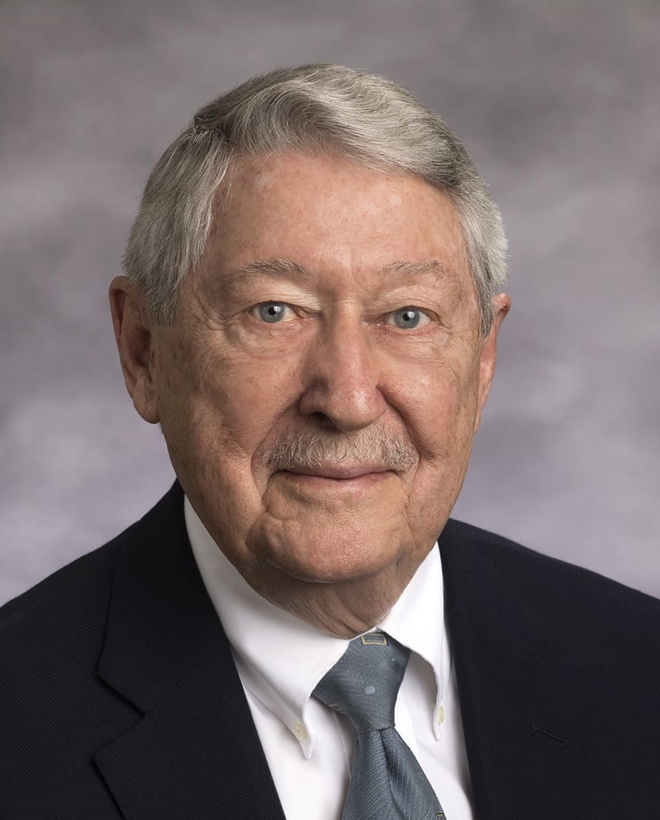Max Dale Cooper


Max Dale Cooper
Pathbreaking scientist, born and raised in rural Mississippi, you began your education on a football scholarship in a community college and have risen to make transformative discoveries to human knowledge. Your revelation of the unique functions of T cells and B cells, and of a separately evolved immune system in primitive vertebrates, laid the foundation for advances in modern medicine that have saved and improved countless lives. Changemaker for human health and longevity, we join a grateful chorus as we grant you the Yale degree of Doctor of Medical Sciences.
Max Dale Cooper, M.D.—the physician-scientist whose path-breaking research opened up the earliest frontiers of immunobiology—is a professor of pathology and laboratory medicine at the Emory University School of Medicine; a Georgia Research Alliance Eminent Scholar; and a member of the Emory Vaccine Center, of the Emory Center for AIDS Research, and of the Winship Cancer Institute. His discovery that there are two pivotal cell types in the immune system, each playing its own role to fend off disease, paved the way for modern medical advances including stem cell transplants, the use of monoclonal antibodies, and cancer immunotherapy.
Cooper was born in rural Mississippi, where his mother was a primary school teacher and his father a mathematician and high school principal. He recalls a childhood filled with exploration, curiosity, and an ample supply of books in his home—reading material that kindled an early love of learning. He attended Holmes Junior College (now Holmes Community College) before completing undergraduate and graduate degrees from the University of Mississippi. In 1957 he earned his M.D. from the Tulane University School of Medicine. Specializing in pediatrics, he moved to London to train at the Hospital for Sick Children in London, today known as Great Ormond Street Hospital. His patients, in particular children whose immune deficiencies left them unable to survive infections as simple as a fever blister, inspired Cooper to pursue a fellowship in allergy and clinical immunology at the University of California, San Francisco. Returning to New Orleans to begin his academic career at Tulane, Cooper sought out laboratory research training in pediatric immunology.
“One of the most remarkable things about a lifelong journey of learning is that one can start almost anywhere and end up in the most unforeseen places, being constantly amazed by what you discover along the way.”
It was this work—under the guidance of Robert Good, the University of Minnesota physician who performed the first successful bone marrow transplant in humans other than identical twins—that led to Cooper’s groundbreaking discovery. Conducting comparative studies between immune-deficient patients and chickens, he identified two distinct classes of lymphocytes with
different origins, now known as T cells and B cells. His research showed that non-antibody-producing T cells are responsible for cellular immunity and protection against viruses, whereas the antibody-producing B cells are primarily responsible for humoral immunity against bacteria and other infectious agents. By combining his own observations with other researchers’ findings, Cooper was able to construct a model of immune system development that became a roadmap for the analysis, classification, and treatment of immunodeficiency diseases, lymphoid malignancies, and autoimmune disorders. Subsequent research led to his discovery of a separately evolved immune system in jawless vertebrates (the eel-like lampreys and hagfish) with important implications for diagnosing and, potentially, treating human diseases in the future.
In recognition of the far-reaching impact of his research, Cooper has been awarded the Founder’s Award of the Society for Experimental Biology and Medicine (1960), the 3M Life Sciences Award (1990), the Avery-Landsteiner Prize for Immunology (2008), the Robert Koch Award (2010), the Japan Prize (2018), and the Albert Lasker Basic Medical Research Award (2019), among other honors. He is a fellow of the Royal Society, London, and a member of the American Academy of Arts and Sciences, the National Academy of Sciences, the National Academy of Medicine, and the Académie des Sciences of the Institut de France.
Cooper is based in Atlanta, Georgia. He and his wife, Rosalie Lazzara Cooper, are the parents of three sons and one daughter.